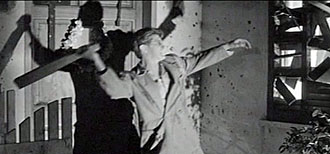Fri 7 Oct 2016
A Movie Review by Jonathan Lewis: THE LAST MAN ON EARTH (1964).
Posted by Steve under Horror movies , Reviews , SF & Fantasy films[3] Comments

THE LAST MAN ON EARTH. American International Pictures, 1964. Vincent Price, Franca Bettoia, Emma Danieli, Giacomo Rossi-Stuart, Umberto Rau, Christi Courtland. Screenplay: William F. Leicester & Logan Swanson (Richard Matheson), based on the latter’s novel I Am Legend. Directors: Ubaldo Ragona & Sidney Salkow.
Since it’s been over a decade since I read Richard Matheson’s I Am Legend (1954), I’m afraid I won’t be of much use in comparing The Last Man on Earth with the original text from which it was adapted. But suffice it to say, this low budget horror film is one of the bleakest movies I’ve recently viewed. Both in plot and mood, The Last Man on Earth resonates with hopelessness.
And not just any type of despair, but an almost borderline nihilism that, when it’s all over, makes it almost difficult to wish it had turned out all that differently. In a very real sense, it’s the script’s fatalism that makes it both a far more compelling story than other vampire tales, but which ultimately ensnares it into a narrative trap in which things simply cannot work out for the protagonist no matter how hard he tries to make it so. Simply put, being the last man on the planet is not an inevitable position.
Vincent Price, in a role largely bereft of his trademark wit and ironic detachment, portrays Dr. Robert Morgan. He’s a scientist by trade and a family man by nature. When we first encounter him, we see that he’s living alone in a house in a world marked by abandonment and decay. There are vampires on the prowl every night and as far as we know, he’s the sole survivor of a plague that has devoured humanity and left death and vampirism in its wake. So Morgan, year after solitary year, hunts vampires by day and locks himself inside his house at night.
All that changes when he encounters a mysterious woman who, like him, travels freely in daylight. But who is she and what clues does she possibly hold to help Morgan solve the puzzle of what happened to the world? The answer, such as it is, isn’t so much predictable as it is a depressingly commentary on humanity.
Perhaps that was the whole point of the screenplay: to be an acerbic political observation. Fair enough, but then again one need not be beaten over the head with wooden stakes for ninety minutes to make a point.
October 7th, 2016 at 6:15 pm
I am in the reverse situation, seeing the film a while ago, but reading the book a few months ago. Both were excellent. The original screenplay was by Richard Matheson. The plots are basically the same, though the film ending is set in slightly different circumstances.
The book is quite short so it is a comfortable 1 or 2 day read.
I have not seen the subsequent movie versions, The Omega Man (1971) or the more recent Will Smith I am Legend.
Until I read the book my memory of the film was that the dead were much more zombies than vampires.
October 8th, 2016 at 1:08 am
The low-budget seat-of-the-pants look of the film is perfectly suited to the story. As if it were made by — not about — the last man on earth.
May 26th, 2017 at 1:02 pm
I just saw this movie again and it’s pretty bleak. I see that Dan Stumpf also reviewed it for MYSTERY FILE back in 2012 and liked it a lot.